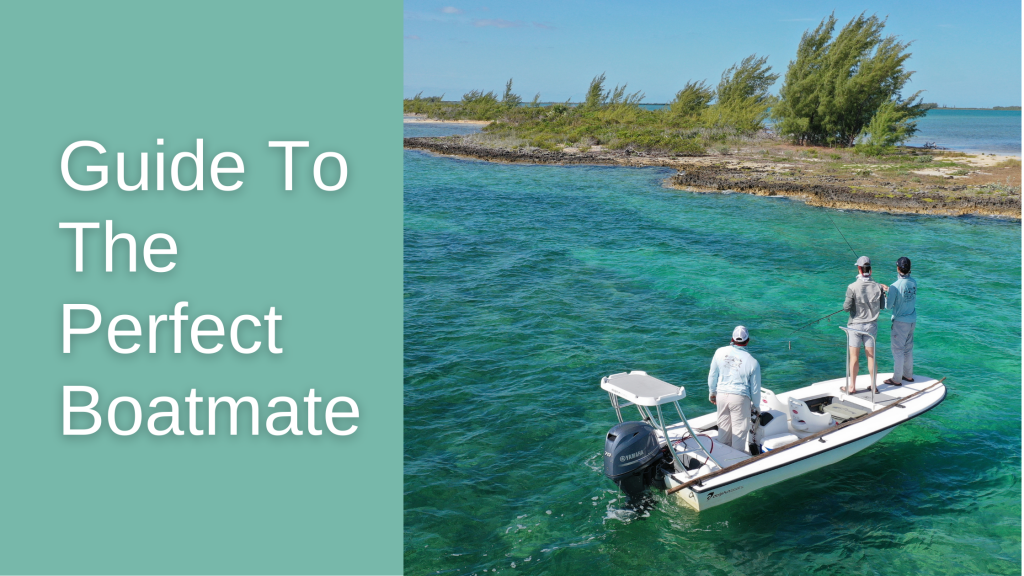Fly fishing has a tendency to get the adrenaline up, especially when you spot something big, beautiful, and worthy of catching.
This leads to oversights and hasty decisions that often result in tangled lines, missed opportunities, and even physical injuries. From making loud, sudden noises, to carrying too much gear, there are countless ways to make trips both frustrating and unproductive. However, with the right attitude and a willingness to pitch in, a great boatmate can increase everyone’s likelihood of making a prize-worthy catch.
Travel with a Team Sport
Never travel with anyone who maintains an “every man for himself” attitude. People who are loud, messy, and focused solely on their own experiences won’t just fail to provide the assistance that everyone needs and deserves; they’ll also leave out trip and fall hazards like excessive lengths of line or recently shed foul-weather gear. A team sport is conscious, considerate, and willing to take steps to ensure that everyone is comfortable and having a good time.
Keep a Tidy Boat
Keeping the boat tidy is all about eliminating fly line snags and trip hazards. With an organized boat, you can find what you need in a pinch, and you can also avoid making loud sounds that scare fish away. The best boatmates are good about putting things back in their place, regularly clearing off the deck, and only stripping off as much fly line as they need.
The Duties of Being a Co-Pilot
More often than not, being a co-pilot is a lot like being a designated driver. You might be coming to the party, but you’ll be the one making sure that everyone is comfortable and safe. A co-pilot’s duties start even before boats head out. When assuming this role, you’ll want to verify that the boat and all equipment are ready. This includes checking for the right tackle, cutting and prepping the bait, and gathering and assembling all lures or jigs. Take the time to inspect the engine oil, and look for leaks at all fittings and shafts. All cables should be securely tied down, and the boat should have a nice stock of first-aid and emergency equipment.
While fishing, you’ll be the one helping store fish, untangle lines, and ensure that no one’s injured or ill. You can pass out lens wipes, keep everyone refreshed with water and snacks, and maintain a tidy deck. Contrary to what many people think, a co-pilot or first mate isn’t all that preoccupied with fishing itself. This person is the support that keeps everything running smoothly, and ensures that no preventable problems arise.
Proper Boat Etiquette
Even if you’ve got a helpful co-pilot onboard, you should still be fastidious about organizing and cleaning up your own messes and gear. When you do, problems will be minimal, fewer accidents will happen, and there will less mess all-around. Only ever strip the amount of fly line that you’ll be casting. This will keep it from blowing overboard, getting caught on immovable, uncovered boat fixtures, or tangling up. It will also make things much easier for everyone else around you.
One of the most important things to remember in boat etiquette is to never cross over into someone else’s territory. If your partner is fishing from the front end of the boat, don’t try to join him when the water appears empty and calm on your side. This will invariably lead to tangled lines, frustration, and other issues. Stay right where you are and make the best of your own space. Finally, when leaving the boat, always let everyone know before stepping off. This way, high-siding can be used to counterbalance the remaining weight and keep the boat centered.
Ultimately, great boat mates think of others before they think of themselves. When everyone is considerate, watchful, and helpful, fishing trips are always fun, productive experiences. Even when you aren’t playing the role of co-pilot, taking the time to clear the deck, and being considerate in how you manage your line and mind your noise will create the ideal fishing environment.








